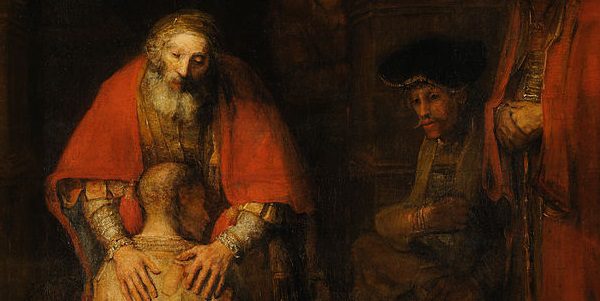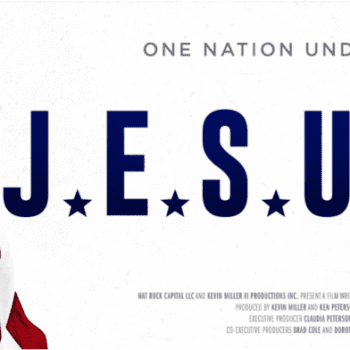
Pastors have a frequent question when they begin to discover mimetic theory. “That’s great. But how does it preach?”
Reverend Tom Truby shows that mimetic theory is a powerful tool that enables pastors to preach the Gospel in a way that is meaningful and refreshing to the modern world. Each Wednesday, Teaching Nonviolent Atonement will highlight Tom’s sermons as an example of preaching the Gospel through mimetic theory.
In this sermon, Tom explores the Parable of the Prodigal Son, or maybe better titled, the Parable of the Forgiving Father. Tom highlights the rivalry between the sons and the father’s unconditional love for them both. The hope of the story is that we might see all people “as children invited to the party that [is] bigger than us all.”
Year C, Lent 4
March 6th, 2016
By Thomas L. Truby
Luke 15:1-3, 11b-32
I Love You Both
The religious people and legal experts grumbled because Jesus ate with people he shouldn’t eat with and allowed people close to him who shouldn’t come near. Doesn’t Jesus know that good people never let shady types touch them?
In response to their excluding, Jesus tells a story. It’s about a man who has two sons. Do you think there is rivalry? I wonder if these brothers like each other. Who does father love most? Is there a good son and a bad son?
The younger of the two says to his father, “Father, give me the share of the property that will belong to me.” This young man wants his father to split up the estate right now and give him his share. No mention is made of the young man’s intention in asking.
Without asking even one question the father complies! The text simply says, “So he divided his property between them.” The younger son gets what he wants now and the older son doesn’t object. He appears to have given over everything to his two boys. He holds nothing back.
A few days after this strange division, the younger son liquidates his assets and leaves the country with his entire inheritance. Was the older brother glad to see him go? It looks like the older brother won in this competition.
The younger brother, now free, can forge his own destiny. Having escaped the boundaries established by his family and culture, the younger brother has no idea how to live. His money leaves him like water from a leaky bucket.
Catastrophe hits. With no money left, famine descends on the whole country and the young man finds himself desperately hungry in a foreign land. Nobody cares about him. He’s on his own and things are getting worse. He decides to take a job for one of the citizens of his adopted country and his boss sends him to the fields to feed the pigs. His descent has taken him to the bottom and he finds himself lower than he had ever imaged he could go.
He’s so hungry he would like to share the pea pods with these pigs. His father back home had given him half his kingdom but now no one will give him anything. His desire to escape his dependence on his father and leave his brother has led to this desperate and dire dead-end.
At that moment something happens. Something resolves within him. The text says, “He came to himself.” He began thinking about his father. He hadn’t thought about his father since before he had requested his inheritance. Maybe the hardship and suffering had burned away his delusions. Maybe now he could see his father.
The desperate young man thought, “How many of my father’s hired hands have bread enough and to spare, but here I am dying of hunger!” A plan forms. He will humble himself, acknowledge his huge insensitivity toward his father and gladly receive the lowest status in his father’s domain if his father will allow him back.
“So he set off and went to his father. But while he was still far off, his father saw him and was filled with compassion; he ran and put his arms around him and kissed him.” He hadn’t seen his father for years, even before he left, he hadn’t seen his father. Now he returns and the father runs toward him with joy and kisses him.
The son begins his rehearsed speech, acknowledging his unworthiness, but the father interrupts him to tell his slaves to quickly bring out the best robe, a ring for his finger and sandals for his returned son’s feet. The father joyously proclaims “this son of mine was dead and is alive again; he was lost and is found! And they began to celebrate.” All along all the father wanted was for his sons to choose to be in relationship with him. Nothing else mattered. The cost didn’t matter. The relationship did. He didn’t want his rebellious younger son to be cut off and far away.
Applied back to the situation that prompted the story, when the tax collectors and sinners were gathering around Jesus to listen to him, Jesus was overjoyed. The lost younger brother had returned and wanted a relationship. It was a time for celebrating not grumbling.
“Now the elder son was in the field; and when he came and approached the house, he heard music and dancing. He called one of the slaves and asked what is going on. He replied, ‘Your brother has come, and your father has killed the fatted calf, because he has got him back safe and sound.’” Do you think the older brother will be happy about his return? Our text says, “Then the older son was furious and didn’t want to enter in, but his father came out and begged him.”
The father does the same thing toward the oldest son that he did with his youngest son. He came toward him assuring him of his love. He wants to be in relationship with him. He loves them both and pleads with his older son to join the party. But his older son will not budge and says, “Listen! For all these years I have been working like a slave for you, and I have never disobeyed your command; yet you have never given me even a young goat so that I might celebrate with my friends.” Could the older son have viewed his relationship with his father differently? The older son had made himself a slave following commands rather than a son living in peace and joy with his loving father.
Right now we have older brothers galore all over this nation all uniting in support of political candidates who oppose widening the party to include those they think of as prodigal. Jesus wouldn’t have liked it and would have told this story to get us to see differently. The contemporary older brothers say keep out any who are different than us, they haven’t slaved away doing the right thing like we have, and they don’t deserve to be included. It’s not fair that they have health care and welfare and money to help them attain an education. We are the ones who have been faithful and we deserve more than they. No one seems to recognize that when we are all doing well we all do better. We are all brothers and sisters not rivals and competitors. God wants us to enjoy each other not destroy each other.
The older brother continues, “When this son of yours came back, who has devoured your property with prostitutes, you killed the fatted calf for him!” Notice the older brother does not claim his brother as his brother. He calls him this “son of yours”. He wants nothing to do with him. He was glad when his brother left. He feels superior to his brother and doesn’t want him around. He’s as cold toward his father and his brother now as his younger brother was when he was dissipating his father’s wealth.
The father sees his coldness and still loves him! He forgives him like he forgave his younger brother. “Son,” he says, “you are always with me.” Your brother’s return doesn’t change our relationship. I will always love you just as I always loved your brother. I love you both.
Eleven days ago there was an unusual event in Portland. A group called Black Violin played at Orchestra Hall downtown. They are two African American violinists and a drummer who combine hip hop and classical music. The audience that night was half white and half black and they were playing music that appealed to both. The crowd was wildly enthusiastic with clapping and dancing and arms waving in the air. For the encore the Bravo Youth Orchestra came on stage and performed with the two violinists and their drummer. These are third, fourth and fifth graders of every color and ethnicity and they were playing together. The crowd roared in support and approval as every one of those children played with all the strength and precision they could muster. For Laura and me it was a moment in which we felt God’s love for all his children. There were no tax collectors and sinners, no Pharisees and legal experts dividing us that night. We were all children invited to the party that was bigger than us all.
As the huge crowd left Orchestra Hall; black and white, Asian and Hispanic people mingled together in awe of the spirit we all felt as we rubbed shoulders and made way for each other. Each of us felt honored to be there and none of us felt superior or inferior even though we were all very different from one another. We left that building aware of each other and celebrating our unity. We all found something we had lost that night and something came alive in us that had been dead. It had something to do with hope. Amen.











